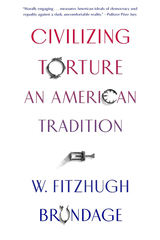
Pulitzer Prize Finalist
Silver Gavel Award Finalist
“A sobering history of how American communities and institutions have relied on torture in various forms since before the United States was founded.”
—Los Angeles Times
“That Americans as a people and a nation-state are violent is indisputable. That we are also torturers, domestically and internationally, is not so well established. The myth that we are not torturers will persist, but Civilizing Torture will remain a powerful antidote in confronting it.”
—Lawrence Wilkerson, former Chief of Staff to Secretary of State Colin Powell
“Remarkable…A searing analysis of America’s past that helps make sense of its bewildering present.”
—David Garland, author of Peculiar Institution
Most Americans believe that a civilized state does not torture, but that belief has repeatedly been challenged in moments of crisis at home and abroad. From the Indian wars to Vietnam, from police interrogation to the War on Terror, US institutions have proven far more amenable to torture than the nation’s commitment to liberty would suggest.
Civilizing Torture traces the history of debates about the efficacy of torture and reveals a recurring struggle to decide what limits to impose on the power of the state. At a time of escalating rhetoric aimed at cleansing the nation of the undeserving and an erosion of limits on military power, the debate over torture remains critical and unresolved.
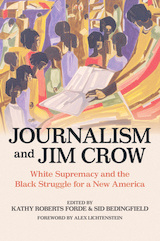
White publishers and editors used their newspapers to build, nurture, and protect white supremacy across the South in the decades after the Civil War. At the same time, a vibrant Black press fought to disrupt these efforts and force the United States to live up to its democratic ideals. Journalism and Jim Crow centers the press as a crucial political actor shaping the rise of the Jim Crow South. The contributors explore the leading role of the white press in constructing an anti-democratic society by promoting and supporting not only lynching and convict labor but also coordinated campaigns of violence and fraud that disenfranchised Black voters. They also examine the Black press’s parallel fight for a multiracial democracy of equality, justice, and opportunity for all—a losing battle with tragic consequences for the American experiment.
Original and revelatory, Journalism and Jim Crow opens up new ways of thinking about the complicated relationship between journalism and power in American democracy.
Contributors: Sid Bedingfield, Bryan Bowman, W. Fitzhugh Brundage, Kathy Roberts Forde, Robert Greene II, Kristin L. Gustafson, D'Weston Haywood, Blair LM Kelley, and Razvan Sibii
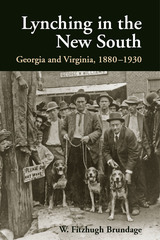
A groundbreaking study, Lynching in the New South is a classic portrait of the tradition of violence that poisoned American life.
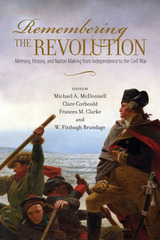
Recollections of the Revolution did not always take today's form. In this lively collection of essays, historians and literary scholars consider how the first three generations of American citizens interpreted their nation's origins. The volume introduces readers to a host of individuals and groups both well known and obscure, from Molly Pitcher and "forgotten father" John Dickinson to African American Baptists in Georgia and antebellum pacifists. They show how the memory of the Revolution became politicized early in the nation's history, as different interests sought to harness its meaning for their own ends. No single faction succeeded, and at the outbreak of the Civil War the American people remained divided over how to remember the Revolution.

This first book-length study of the Ruskin colonies shows how several hundred utopian socialists gathered as a cooperative community in Tennessee and Georgia in the late nineteenth century. The communitarians' noble but fatally flawed act of social endeavor revealed the courage and desperation they felt as they searched for alternatives to the chaotic and competitive individualism of the age of robber barons and for a viable model for a just and humane society at a time of profound uncertainty about public life in the United States.
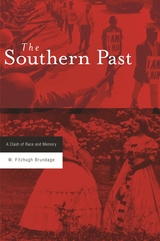
Since the Civil War whites and blacks have struggled over the meanings and uses of the Southern past. Indeed, today’s controversies over flying the Confederate flag, renaming schools and streets, and commemorating the Civil War and the civil rights movement are only the latest examples of this ongoing divisive contest over issues of regional identity and heritage. The Southern Past argues that these battles are ultimately about who has the power to determine what we remember of the past, and whether that remembrance will honor all Southerners or only select groups.
For more than a century after the Civil War, elite white Southerners systematically refined a version of the past that sanctioned their racial privilege and power. In the process, they filled public spaces with museums and monuments that made their version of the past sacrosanct. Yet, even as segregation and racial discrimination worsened, blacks contested the white version of Southern history and demanded inclusion. Streets became sites for elaborate commemorations of emancipation and schools became centers for the study of black history. This counter-memory surged forth, and became a potent inspiration for the civil rights movement and the black struggle to share a common Southern past rather than a divided one.
W. Fitzhugh Brundage’s searing exploration of how those who have the political power to represent the past simultaneously shape the present and determine the future is a valuable lesson as we confront our national past to meet the challenge of current realities.
READERS
Browse our collection.
PUBLISHERS
See BiblioVault's publisher services.
STUDENT SERVICES
Files for college accessibility offices.
UChicago Accessibility Resources
home | accessibility | search | about | contact us
BiblioVault ® 2001 - 2024
The University of Chicago Press









